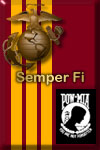Other Personnel In Incident:
Frank E. Cius (returned POW 1973);
Timothy R. Bodden; Ronald J. Dexter; Stephen P. Hanson; Billy Laney; (all missing);
Mr. Ky (Nung Cdr. - wounded and rescued);
Charles F. Wilklow (rescued)
REMARKS: LAST SEEN IN CRASHED AIRCRAFT
SYNOPSIS:
On June 3, 1967, Capt. Steven P. Hanson, pilot; 1Lt. John G. Gardner,
co-pilot; Sgt. Timothy R. Bodden, crew chief/door gunner; LCpl. Frank E. Cius, doorgunner;
SFC Billy R. Laney, SFC Ronald J. Dexter, SFC Charles F. Wilklow and an unknown number of
ARVN personnel, all passengers, were aboard a CH46A helicopter (serial #150955)
on an extraction mission in Laos.
The USMC aircraft picked up a U.S. Army Special Forces team attached to
MACV-SOG, Command and Control, and the ARVN troops they were working with.
Military Assistance Command Vietnam Studies and Observation Group (MACV-SOG)
was a joint service high command unconventional warfare task force engaged in highly classified
operations throughout Southeast Asia. The 5th Special Forces channeled personnel into
MACV-SOG (not a Special Forces group) through Special Operations Augmentation (SOA)
which provided their "cover" while under secret orders to MACV-SOG.
These teams performed deep penetration missions of strategic reconnaissance and interdiction which
were called, depending on the time frame, "Shining Brass" or "Prairie Fire"
missions.
The aircraft received extensive automatic small arms fire upon takeoff from the Landing
Zone, took numerous hits and crashed 350 meters from the LZ, located about 15 miles inside Laos west of
the A Shau Valley. The helicopter did not burn on impact, and continued to receive fire.
Three ARVN troops were able to return to the LZ where the troops remaining at the LZ were extracted the
following day. The troops waiting at the LZ could not search because of the hostile threat in the area.
Air searches located the survivors of the crash, but they could not be evacuated. The only America found
to be in a position to be safely evacuated was SFC Wilklow. He gave the following account of what
happened to the crew and passengers aboard the CH46:
SFC Dexter appeared uninjured and left the wreckage with a large number of ARVN troops.
Capt. Hanson was wounded and outside the helicopter, but stated that he had to return to get his carbine.
The Marine Corps believes Capt. Hanson died of the wounds he received when the aircraft
was overrun, although the Captain's wife later identified her husband in a widely distributed Vietnamese
propaganda photograph of a pilot being captured.
When last seen, all the other Americans were still in the wreckage, and enemy
troops (the U.S. Army says they were Viet Cong; the U.S. Marines say they were North Vietnamese
Army - possibly a joint force of both) were tossing grenades toward the aircraft with no attempt to
capture the personnel inside.
Wilklow left the crash site, and noted that gunfire suddenly stopped. He continued to evade
the enemy and was picked up 3 days later.
When Mr. Ky, the Nung Commander was being evacuated by the last helicopter out, he
noted several men (undoubtedly Dexter and the ARVN) in a large bomb crater firing red star clusters from a
flare gun.
Frank Cius was taken prisoner and released from Hanoi in 1973. He was one of the dozen
or so captured by the Vietnamese and taken immediately to Hanoi that were claimed to be the
"Laos" prisoners.
In reality, none of the dozen had been held in Laos. Ronald Dexter, according to Frank Cius,
was captured, and died in captivity on July 29, 1967.
John Gardner, according to the USMC, died on the ground after the crash of the aircraft due
to intense enemy fire.
Billy Laney was last seen lying wounded on the floor of the aircraft between a crewmember
with a broken back and the door gunner with a head wound.
NOTE:
the USMC states that Bodden, crewchief/door gunner was shot in the back and
never left the aircraft, but reports received by the National League of Families indicate that he was definitely
alive after the aircraft crashed. The U.S. did not know Cius was captured until he was released, evidently
believing he never exited the aircraft, and Wilklow had indicated that the Vietnamese were not trying to
capture the occupants of the aircraft. Therefore, as door gunner, he must have been the "door gunner
with the head wound", and Bodden the "crewmember with a broken back."
Since 1975, the U.S. Government has received thousands of reports relating to Americans still alive in
Southeast Asia. Many of them cannot be dismissed as untrue. Officially, the U.S. says it is operating
under the assumption that men are being held, and that the matter is of "highest national priority."
Yet, we seem unable to resolve the mystery. Nor have they ever negotiated for the "tens of
tens" of American prisoners the Lao stated they held.
There can be no question that the communists know the fate of those who were last seen on the ill-fated
CH 46A that day. The men aboard this craft were inserted into Laos for exceedingly dangerous and
important missions. They deserve no less than America's very best efforts to determine their fates.
If any of them are alive, they must be brought home.


Return
Right click on the square and select play to hear
"Wind Beneath My Wings" on any midi player you have.

Top
|